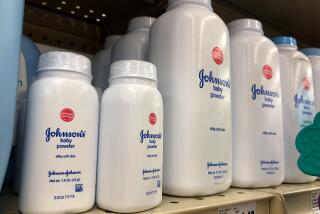28 Lockheed Workers Lose $15.2-Million Judgment
- Share via
BURBANK — A state appellate court has thrown out $15.2 million in damages against five oil and chemical companies accused of failing to disclose toxic hazards used in defense manufacturing at Lockheed’s famed Skunk Works here, lawyers said Tuesday.
The three-judge panel of the 2nd District Court of Appeal ruled in Arnold v. Ashland Chemical Co. that 28 past and present Lockheed employees who claimed to have suffered brain damage, cancer and other ailments as a consequence of their work at the company’s Burbank defense facility were not intentionally harmed.
“Plaintiffs suffered these injuries while involved in some of the most sensitive work in our nation’s defense industry,” Presiding Justice Paul Turner wrote in the unanimous decision dated Friday. “However, there is absolutely no evidence that any vile, base, contemptible, miserable, wretched or loathsome conduct that would be despised by ordinary decent people was engaged in by any defendant or its employees.”
The court overturned both a $7.5-million punitive damage award and a $7.7-million compensatory damage award. Both parties were ordered back to court to reargue the compensatory damages, but the panel said the claim of punitive damages would not be subject to retrial.
The Arnold case is one of a half-dozen court actions brought by a total of 627 workers who worked at Lockheed’s Burbank defense facilities and filed suit against the companies--including Exxon Corp., Union Oil Co. of California, Shell Oil Co., Ashland Chemical Co. and Du Pont.
Attorney Larry Jansen, a lawyer representing the oil and chemical companies in the Arnold case, said Friday’s decision could have an impact on the other cases.
That includes a $760-million verdict in favor of 38 employees, reached by a Los Angeles Superior Court jury in August 1998, that was the largest ever punitive damage judgment rendered in any court in a toxic pollution case. A judge later cut that award in half.
“The justices examined all of the evidence, found there was no oppressive conduct and ordered the trial court to enter a judgment in favor of the companies,” Jansen said. “The impact is that all punitive damages ever awarded will be reversed.”
Jansen said the suits were filed separately because groups of employees worked at the company at different times and may have suffered different consequences.
Lockheed Corp., the forerunner of Lockheed Martin, was established in Burbank in 1928. It employed nearly 100,000 at its peak and churned out aircraft for World War II and the Cold War, including the P-38 fighter, U-2, SR-71 Blackbird spy planes and the F-117A Stealth fighter. It was the home of the legendary Skunk Works, which designed advanced military planes.
Lockheed began closing its Burbank facility in the late 1980s and moved manufacturing to Palmdale and Marietta, Ga. The company merged with Martin Marietta Corp. in 1995 to become Lockheed Martin.
Lockheed has vacated its holdings in Burbank over the past decade, selling off property that has been converted into retail space and offices and marked for other uses.
Cancer-causing compounds were found in the water and soil beneath the company’s industrial sites in Burbank in 1980. Eight years later, after extensive monitoring and testing, federal, state and local agencies determined the water was undrinkable and the soil toxic.
The defense contractor and other companies agreed in 1992 to pay $265 million to clean up toxic compounds originally used as solvents such as perchloroethylene (PCE) and trichloroethylene (TCE). Lockheed also settled with employees who brought suit against the company in 1992.
But Lockheed still faces other legal challenges.
Hundreds of residents blame the defense firm for alleged health problems and declining property values they attribute to the now-closed facility’s discharge of carcinogens and other hazardous substances into the ground, air and water.
In 1996, Lockheed reached a confidential $60-million out-of-court agreement with more than 1,300 current or former city residents.
But since then, another 3,000 civil lawsuits have been filed in state court by individual residents who allege they were sickened by chemicals used at the plant.
More to Read
Inside the business of entertainment
The Wide Shot brings you news, analysis and insights on everything from streaming wars to production — and what it all means for the future.
You may occasionally receive promotional content from the Los Angeles Times.










